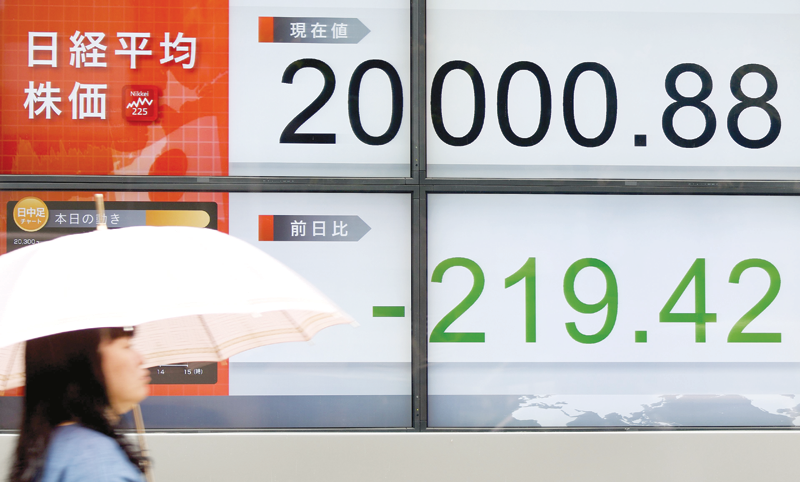

SINGAPORE: The dollar extended its losses on Friday as major central banks signalled that the era of cheap money was coming to an end in a boon to sterling, the euro and the Canadian dollar, while Asian shares were hit by dismal performances of European and US markets.
European markets were set to open a little lower, with financial spreadbetter LCG expecting Britain’s FTSE 100, Germany’s DAX and France’s CAC 40 to all start the day down 0.1 per cent. All three lost between 0.5 per cent and 1.9 per cent on Thursday.
But global stock market indexes are set for more gains by the end of this year, driven by an economic revival in Europe and bright prospects for much of Asia, a Reuters poll of around 300 financial professionals showed.
The dollar index fell 0.1 per cent to 95.549, poised for a 1.8 per cent slide this week, having fallen in all sessions but one. It is down 1.4 per cent for the month, and 4.8 per cent for the quarter.
The Korean won weakened against the dollar after the country reported industrial production rose by 0.2 per cent in May from a month earlier, missing expectations for growth of 1.5 per cent. That followed a 2.2 per cent decline in April
The dollar was up 0.1 per cent at 1,142.5 won.
But the greenback remained lower against other major currencies. Adding to the dollar’s weakness against the yen was data showing Japanese core consumer prices rose 0.4 per cent in May from a year earlier in its fifth straight month of gains, although inflation remains well below the central bank’s 2 per cent target.
The dollar fell 0.25 per cent to 111.95 yen, after losing 0.2 per cent on Thursday. It was heading for a 1.2 per cent gain for the month, but is down 4.2 per cent this year.
Bank of England Governor Mark Carney surprised many on Wednesday by conceding a rate hike was likely to be needed as the economy came closer to running at full capacity.
Sterling was 0.1 per cent higher on Friday at $1.3017, adding to Thursday’s 0.6 per cent gain.
Two top policymakers at the Bank of Canada also suggested they might tighten monetary policy there as early as July.
The dollar slipped 0.15 per cent to Cad$1.2984, extending Thursday’s 0.26 per cent loss.
Despite comments by sources that European Central Bank President Mario Draghi had intended to signal tolerance for a period of weaker inflation, not an imminent policy tightening, the euro on Friday revisited the 13-month high of $1.1445 hit on Thursday.
The euro remained close to that level and was at $1.1439 on Friday, retaining most of Thursday’s 0.6 per cent gain.
“Obviously there’s a shift afoot. It really seems that there’s some coordinated effort going on out here among the G10 central banks,” said Stephen Innes, head of trading in Asia-Pacific for OANDA in Singapore, referring to the series of hawkish-sounding comments on monetary policy.
In stocks, the MSCI’s broadest index of Asia-Pacific shares outside Japan fell 0.7 per cent, after hitting a two-year high on Thursday. It is up 5.3 per cent for the quarter and has risen 18.3 per cent this year.
The negative sentiment infected Chinese shares despite surveys showing activity in the country’s manufacturing and services sector accelerated in June from the previous month. Manufacturers appeared to enjoy strong external demand, as new orders and production rose at a solid pace.
The CSI 300 index fell 0.3 per cent, while the Shanghai Composite slipped 0.1 per cent.
Hong Kong’s Hang Seng slid 0.9 per cent.
Japan’s Nikkei tumbled 1.2 per cent, shrinking its monthly gain to 1.7 per cent. It is up 4.5 per cent this year. Overnight, the tech-heavy Nasdaq led declines on Wall Street with a 1.4 per cent loss. The Nasdaq is poised to post a 0.9 per cent loss for the month, but is still up 14 per cent this year.
The drop in tech stocks overnight was due to a rotation into bank shares, which have lagged this year, after the biggest US banks revealed buyback and dividend plans that beat analysts’ expectations after the Fed approved their capital proposals in its annual stress test programme.
The S&P financials index rose as much as 2 per cent overnight, while the S&P technology index fell as much as 2.7 per cent.
In commodities, oil prices continued their recovery this week on a decline in weekly US crude production.
US crude added 0.7 per cent to $45.15 a barrel in its seventh straight session of gains, bringing its weekly increase to 5.05 per cent, and narrowing its quarterly loss to 10.75 per cent.
Global benchmark Brent gained 0.6 per cent to $47.67 a barrel, poised to post a 9.8 per cent for the quarter.
The dollar’s weakness this year has been a boon for gold, which is up 8.25 per cent in the same period. It was up 0.1 per cent at $1,246.46 an ounce on Friday. — Reuters
Oman Observer is now on the WhatsApp channel. Click here



